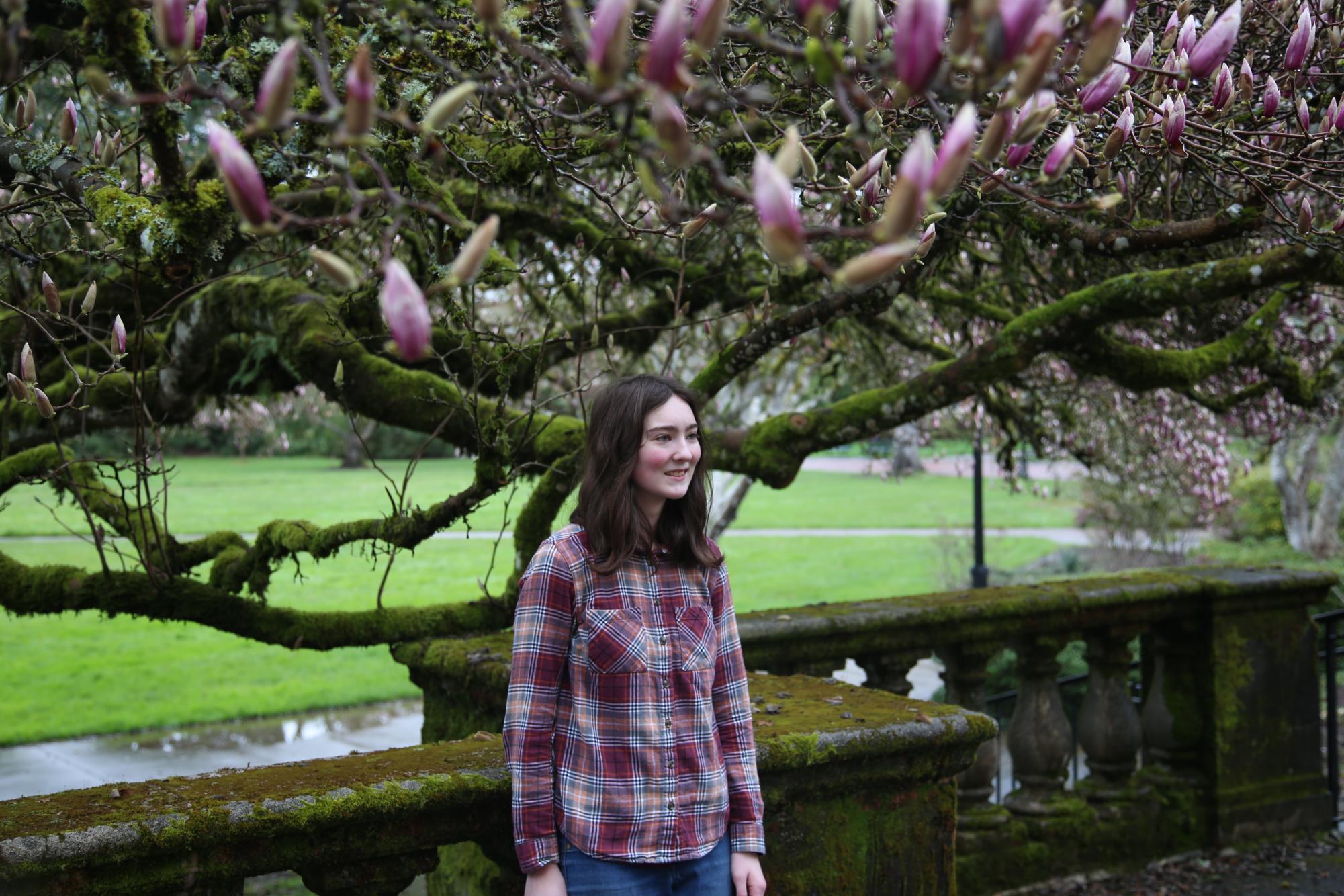Autism, also known as Autism Spectrum Disorder, is a developmental disability caused by differences in the brain, according to the Center of Disease Control and Prevention. These differences can manifest in social communication and interaction problems, restricted or repetitive behaviors and different ways of learning.
In an article published in Autism in Adulthood, a quarterly peer-reviewed academic journal, researchers found that autistic people are known to experience stigma – ignorance, prejudice and discrimination – which affect their health and quality of life.
Although there’s not much data which highlights the experiences of autistic college students, for Oregon State University students Caine Mende, Jenna Rosenau and Brandon Huggins, they’ve experienced their own form of hardships growing up and in college.
For Mende, her parents didn’t believe that she was autistic, even after being diagnosed her senior year of high school.
“My family is relatively traditional. My mother is from Korea,” Mende said. “In her time they didn’t have anything in regards to mental health, neurodivergence and all of that.”
Mende said her parent’s disbelief in her autism diagnosis is “comical,” not only because there were signs of her having ASD at an early age–like refusing to eat food that was a certain color–but also because both her parents are in the medical field.
However, according to Mende, her parents would only use her autism diagnosis as an advantage wherever possible, such as receiving room accommodations when Mende felt they were unnecessary.
Furthermore, Mende’s mother didn’t want her to go to college, initially, because she was afraid of the “meltdowns” she knew Mende would have.
“She didn’t believe that I could make it on my own,” Mende said. “I had been treated poorly because of it.”
In a study published by Sage, an independent academic publishing company, after interviewing 32 autistic adults, researchers found six themes in the data which could help define the experience of a meltdown.
These themes include feeling overwhelmed by informational, sensory, social or emotional stressors, experiencing extreme emotions, challenged with thinking and memory, feeling out of touch and grasping for self-control, finding a release for emotions and self-isolation to avoid triggers or harm.
Although Mende’s first day at Oregon State University was the most stressful, she adjusted well afterwards and made friends pretty quickly. She met one friend because she was playing a song on the piano that he liked.
Mende also utilized the Counseling and Psychological Services on campus her first term, because according to her, she was doing poorly mentally. Now, she considers herself “all right.”
Mende still considers herself disconnected from a community at OSU, but according to her, that’s because she isn’t looking for a connection.
Mende is now a sophomore at OSU, studying biochemistry and molecular biology, and has since been “let off the hook” by her mother.
“My family is fully in support of me being here because they’ve seen my grades,” Mende said.
She currently holds a 3.83 GPA.
However, Mende’s experiences may not always be the same for other people with autism.
Unlike Mende, Jenna Rosenau – third-year biochemistry and biophysics major – received support from her parents about wanting to go to college.
Additionally, Rosenau described connecting with others and finding a community growing up as a “challenging and isolating” experience.
“I was always pretty shy growing up,” Rosenau said. “I was constantly worried about social interactions going wrong and being rejected.”
Making friends and connecting with other people wasn’t hard for Mende either growing up, since according to her, the Catholic private school that she attended had a lot of other students who also had some form of neurodivergence. However, it was difficult for her to find people who were like herself.
Even though she was never bullied for having ASD, people did think she was “strange.”
The reason Mende feels disconnected from communities at OSU is because she doesn’t feel like any speak out to her. However, she has been thinking about joining a club, such as the forestry club, though she has been procrastinating on doing so.
According to the CDC, almost 40% of autistic teenagers and adults spend little to no time with friends. Among college students specifically, the data is muddier because there isn’t a lot of research published in that area.
Rosenau said that although she has adjusted well to OSU, she initially had concerns about connecting with her peers, advisors and faculty members. However, on top of meeting new friends at OSU, she’s managed to stay in contact with her childhood friends – most of whom are also on the autism spectrum.
Rosenau has also involved herself a lot with disability groups on and off campus, like the Disabled Students Union and the Disability Equity Center.
Although she has made great friends at the Disabled Student Union, and recently joined the OSU Equestrian Club, the nonprofit DEC suspended their operations as of June 1, 2023, for various reasons surrounding finances and organizational support.
“Since I’ve been in college I’ve developed a lot more independence,” Rosenau said. “I also feel like I’ve gained a lot more self-confidence and self-advocacy skills.”
Rosenau was diagnosed with ASD at 17, though she had always suspected she had ASD for “quite a while” before then.
As a child, she read a book by Temple Grandin – an animal behaviorist and autism advocate – who wrote about their own experiences having and dealing with autism which resonated with Rosenau. Though she didn’t fully connect the dots until she was older.
“My autism diagnosis really helped me develop my self-identity,” Rosenau said. “It was relieving to finally have the words and language to describe what I was experiencing.”
Brandon Huggins felt similar to Rosenau when he was diagnosed at 16, describing the feeling as “freedom.”
“Things finally started making sense,” Huggins said.
However, Huggins said his family didn’t take the news as well as he did, and even tried to keep him out of therapy because of his diagnosis.
Although life didn’t change much for Huggins after the diagnosis, he believes that his life would have been “a lot simpler” had he been diagnosed at an earlier age.
According to him, he probably would’ve gotten the help that needed, like learning necessary socialization skills to make friends.
“(I) was rejected a lot and excluded from a lot of events because I was different, and (people) didn’t know how to handle that,” Huggins said. “It was hard not having a sense of community until I was an adult.”
When Huggins first attended university at Montana State, he described it as a “disaster.”
“Being autistic and never having freedom before, (it) was way too much for me,” Huggins said.
According to him, although he got good grades his first term, he had a hard time taking care of himself and “being an adult” that he flunked out his second term, at 18, and didn’t go back to a university – OSU – until he was 24. Though he did attend Portland Community College for two years, learning a trade as a machinist.
“Back then, I was worried about (my) social life and random things,” Huggins said. “Versus today, I’m now mission driven on getting my degree.”
At Montana State, Huggins was introduced to marijuana and was immediately hooked because it made him feel “calm and numb.” He was smoking everyday for a term and even got in trouble a couple times, which resulted in him having to take a drug class.
Huggins is now a fourth-year at OSU, studying accounting, as has described connecting with his peers in college as still a struggle, but much easier than when he was growing up.
Being a peer tutor for the College of Business, he is able to connect with coworkers as well as other students who share the same major as him.
“Everytime I’m in Austin Hall, I see someone I know and have a conversation with them,” Huggins said. “I think it’s awesome.”
Like Mende, Huggins has also utilized CAPS until he was able to find his own private provider.
Furthermore, taking online classes before in-person classes really helped Huggins adjust back into the university mindset since it cut out a lot of stress, such as finding the classrooms and parking.
According to the article published by Autism in Adulthood, mentioned earlier, stigma around autism is affected by people’s poor understanding of autism and autistic traits, due to misinformation, cultural factors, the quality and quantity of contact with autistic people and more.
Furthermore, autistic people can experience loneliness and fewer friendships compared with neurotypical peers, fewer friendships in adolescence compared with peers with other special educational needs, more difficulties with education and employment, poor social integration and high rates of bullying. All these factors contribute to a reduced quality of life.
Rosenau mentioned Damian Milton’s double empathy problem as a theory that could help to explain the misconceptions and misunderstandings during interactions between autistic people and allistic – non-autistic – people.
Milton is a British sociologist and social psychologist who specializes in autism research. His double empathy theory refers to the misunderstandings that may arise during social interactions between autistic and allistic people due to their different dispositional outlooks and conceptual understandings.
These misunderstandings may be seen as unusual for an allistic person, but common for an autistic person.
Huggins, Rosenau and Mende are all open about their disability to their allistic friends, which are met with a response from neutrality, to understanding to interest.
“If you’re autistic, don’t let anybody tell you that you can’t do something. The only one that can determine whether or not you can is yourself,” Mende said. “(I’ve) learned that since coming to college.”
Rosenau advises other people who are autistic to embrace their neurodiversity as a part of their uniqueness, and recognize their strengths and experiences as attributes that contribute to diversity rather than a deficit.
“My number one advice for people who are autistic is to advocate for themselves,” Huggins said. “If you can’t advocate for yourself, find someone who will. It’ll make life that much (easier).”
Huggins, Rosenau and Mende also have access to accommodations from Disability Access Services, though Mende hasn’t used the service this year – compared to last year – because she feels she doesn’t need it. These accommodations include things such as housing and extended time on tests.
Although they have all described DAS as accessible and a positive experience, Rosenau and Mende both described the application process to get access to their services as anxiety inducing.
“Getting access to the access is kind of daunting,” Mende said.
Furthermore, Mende and Huggins have had negative experiences with CAPS for different reasons.
Huggins said that the two sessions he had with CAPS wasn’t bad, however he was told that he needed a higher level of care for the mental health struggles that he was going through at the time. While Mende said the process of getting assigned someone to help was the hardest part.
Mende believes that DAS should be more openly talked about and advertised, besides just being formally discussed in classrooms, similar to how clubs are advertised.
Rosenau believes the university could better support disabled and autistic people by reaching out more and checking in with the students, to see if they need any more help.
“Right now, it’s like a one and done type thing,” Rosenau said.

















































































































